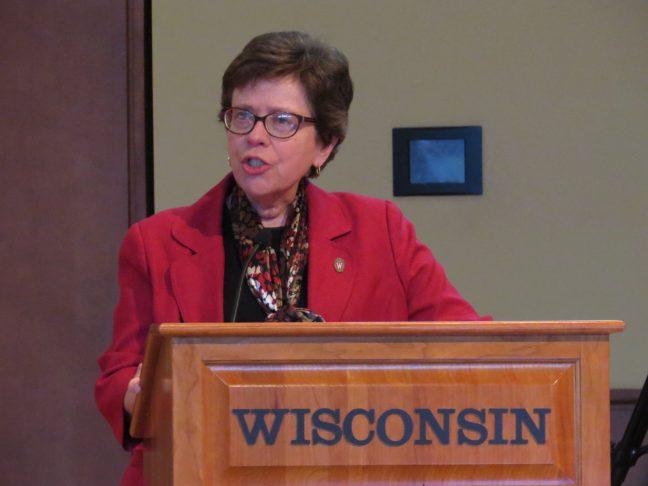University of Wisconsin Chancellor Rebecca Blank apologized Monday in a statement to the Wisconsin State Journal for emails sent last summer suggesting Big Ten leaders’ discussion about COVID-19 be moved to a more private platform.
The Washington Post first reported the emails. In one statement, Blank wrote to fellow Big Ten chancellors and presidents that, while she would be “delighted to share information,” they could move the conversation to the Big Ten portal in order to “assure confidentiality.”
The chancellor’s assistant Dianna Klein conducted a search for Blank’s Big Ten meeting briefing materials following a request from The New York Times. But, Klein found some emails in Blank’s inbox had links to the password-protected portal where Blank reviewed documents, according to the Wisconsin State Journal.
Blank told Klein the documents were not in her own possession and documents on a Big Ten secure site can’t be accessed through Wisconsin public records law, according to the Post reporting. The UW System and the interpretation of the Wisconsin Department of Justice say the content of a record determines if it is subject to state records laws, regardless of medium, format or location.
UW professor and James E. Burgess Chair in Journalism Ethics Kathleen Culver said the general principle is a public official or any records custodian in Wisconsin cannot evade the Wisconsin open records law. Though Culver said Blank’s assessment of the law may have been considering COVID-19 discussion as policy developments in draft form.
“One of the things that the Wisconsin open records law offers some protection for is the development of policy while it’s in draft form, but emails have generally not been considered to be policies in draft form,” Culver said. “… the argument here seems to be that while you’re using this portal, it was a tool for deliberation, rather than a tool for hiding policy.”
Culver added that Blank’s Big Ten plans pertaining to COVID-19 are some of the most important decisions being made during her time as chancellor. Culver said having public conversation about the reopening of the university in the face of a global pandemic is an issue of vital public importance — not only to the taxpayers who fund the school but, really, to all citizens of Wisconsin, students, parents and healthcare workers.
With plans about opening campus during COVID-19, however, Culver said it can be difficult to create policies when information about the state of the pandemic changes constantly. The Wisconsin open records law provides some protection for dealing with deliberations which may be fickle or might never be part of the final policy, so Culver said some elements of the chancellor’s intentions may be understandable.
“If we are choosing a deliberation space for the purpose of deliberating in the public interest and developing policies that best serve all the people, that’s great,” Culver said. “… but if we’re using that platform specifically to field this information from public view, that is a problem.”
The UW System is reviewing the matter after learning about it late last week, according to the Wisconsin State Journal.
In her apology, Chancellor Blank voiced regret about the language she used in the email exchange. Blank added she does not use the Big Ten board portal regularly for her responsibilities in conferences and that she regularly releases her emails upon request.
“I said it was necessary for [Blank] to apologize,” Culver said. “I also think it’s a breath of fresh air that a leader comes out and apologizes and says, ‘Well, this is not what I intended and it’s also not appropriate’… I think she was right to apologize, and I welcome the fact that it came swiftly and clearly.”


